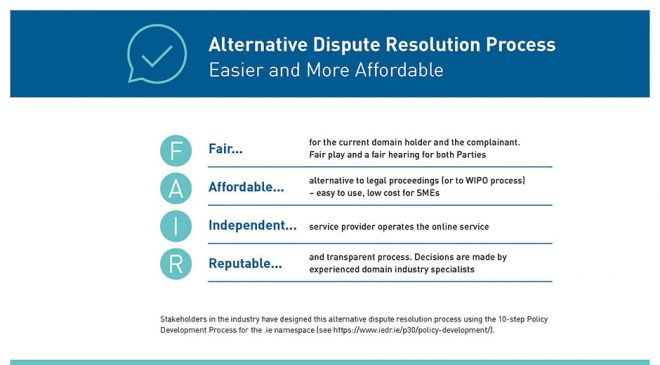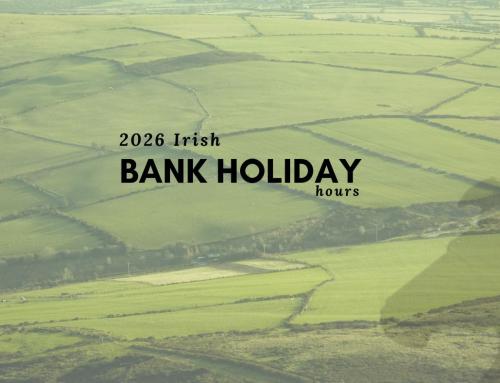In July IE Domain Registry (IEDR) introduced an Alternative Dispute Resolution Policy (ADRP) for domain name disputes. The existing formal IE Dispute Resolution Policy remains an available option, but the new process is designed to be simpler and less expensive for non-corporate complainants, who form the bulk of the .IE community.
Neither policy affects a person’s statutory rights, and all parties have recourse to the Irish courts if they wish to do so.
So how does the new process work? Why was it introduced and what has been the response in the weeks since it became available?
We invited Sarah McCreesh from IEDR to join us on the Blacknight podcast to discuss these questions and more.
Click on the player below to play the podcast, or download it here: 24:21; 14MB; MP3.
Sarah is a Policy Analyst with IEDR, and her responsibilities include coordinating the registry’s Policy Advisory Committee (PAC), which includes stakeholders such as Blacknight, and which has recommended a number of policy initiatives in recent years, including the liberalisation of registration rules, which came in last year.
The Alternative Dispute Resolution Policy is the latest of these initiatives. The formal dispute resolution process is based on World Intellectual Property Organaistion (WIPO) rules; it conforms with international best practice and is widely understood by industry experts internationally. But, as Sarah explains, the PAC felt that something simpler and more cost-effective was needed for many of the disputes which occur in the .IE namespace.
“We’ve had the existing formal Dispute Resolution Policy for many years and that caters more to the rights-based side of things, for trade-marks and what-not … it’s well-regarded and it’s operated through the World Intellectual Property Organisation (WIPO) … Over the years we’d had anecdotal evidence coming through that – while that was fine for the IP community and for their brand managers – there was kind of a gap in terms of having a dispute mechanism for SMEs and for the wider pool of .IE users”
Sarah McCreesh, IEDR
Costs for the WIPO process start at €1500, or €4500 if you want 3 panelists, Sarah explains. By contrast, the alternative policy costs €200 for an intitial complaint, or €750 if the registrant engages with the complaint.

The committee looked at international best practice in other domain registries and they found that there was a precedent for a simplified dispute resolution process to run in parallel with the formal process.
The alternative process exploits some of the unique elements of the .IE rules in order to shortcut the process. This includes the fact that all registrants have verified their identities on registration and proven their connection to Ireland. A key feature of the ADRP is that the burden of proof is on the complainant.
The ADRP is managed by a company called Net Neutrals, which specialises in online dispute resolution. Expert mediation is a key element of the service they provide.
“Their whole process is built on engaging from the very start. Even before the official mediator gets involved, the parties are brought together into a private forum online to have a discussion about. In theory you would think they need that mediator from the very first step, but what’s actually happening is the parties do tend to engage with each other and they try to find a solution”
Sarah McCreesh, IEDR
Since the alternative policy came into effect in July, there have been 5 disputes regarding .IE domain names. Four of those have elected to use the alternative policy.
For more information about the new dispute resolution process, visit iedr.ie/adrp.
Subscribe for free to receive The Blacknight Podcast, via Apple Podcasts or RSS.
![Sarah McCreesh of IE Domain Registry is a guest on the Blacknight Podcast. She talks about the registry’s new dispute resolution policy. New Policy Finds Favour for Dot-IE Disputes [Audio]](https://blacknight.blog/wp-content/uploads/2019/08/IE_ADR_BANNER-1440.jpg)





